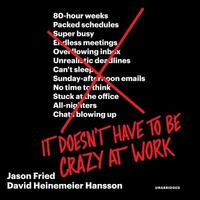You need to sign in or sign up before continuing.
Take a photo of a barcode or cover
informative
fast-paced
challenging
funny
hopeful
informative
inspiring
lighthearted
fast-paced
A lot has changed about our work spaces since the COVID-19 pandemic started in 2020. Before this, very few companies considered allowing any portion of their employees to work from home. Then we were all forced to figure out how to do so if it was at all possible. Now, as the pandemic starts to wane, businesses are trying to figure out how to manage with the new expectation of working from home.
Just as the pandemic has challenged employers to revisit their attitudes toward their employees working from home, so have the authors of It Doesn't Have to Be Crazy at Work challenged traditional views of how companies should be run. Their company (Basecamp) is 100% remote and has been since it started. And in this book the authors outline many other aspects of how they run their successful company (it has been profitable from day one).
In short essays, they talk about how they run their business. Here is a sample of some of the subjects covered.
- Paying for their employees' vacations
- Limiting work to only 40 hours a week (32 hours in the summer months)
- Paying everyone in the same job the same salary
- Doing less but doing it better
The writing in the book is straightforward, funny, and approachable. But perhaps my favorite aspect of the book is that they state right up front that they developed these ideas as they went. That some things that worked when they were a small company of only three people didn't work when they were a company of fifty people. I find it refreshing—that kind of perspective and willingness to change policy and procedure.
So while not all of the ideas in this book may appeal to you or your company, the thinking behind these ideas is worth you time to contemplate and consider.
inspiring
reflective
relaxing
medium-paced
This was a great way of getting into the mindset of identifying and rejecting bad working practices. Not every point in the book applies to every job or company - but that would be a ridiculous expectation. The value of this book is in its title. It reminds the reader that it doesn't have to be crazy at work, and that they can cultivate or find a healthy working environment. It helps the reader reject the idea that "this is just how it is, there can't be anything better than this, it's probably as good as it will get".
In general: I really liked the principles in this book. I do think it's an important mindset that (as a director of technology) I wish my industry had more of, and a mindset I do my best to foster within my team.
However, I couldn't give this five stars. Not even four. Because ultimately, it felt like an arrogant, self-congratulatory and book-length advertisement about why you should work for Basecamp. And I get it, it's a culture to be proud of, but as a book and not a blog I expected there to be research applied, or even anecdotes from other companies in the mix.
However, I couldn't give this five stars. Not even four. Because ultimately, it felt like an arrogant, self-congratulatory and book-length advertisement about why you should work for Basecamp. And I get it, it's a culture to be proud of, but as a book and not a blog I expected there to be research applied, or even anecdotes from other companies in the mix.
I wanted to love this book, I really did. Instead, the entire text read like a sales pitch for the authors’ company, Basecamp. I understand the references to the company were to show real world examples of how each guideline or rule has been successful, but the book left a lot to be desired. I’m giving two stars only because I was able to find some meaningful information that I can apply to my workplace.
informative
medium-paced
Quick and insightful. Offers some neat ideas for how to work to live, rather than live to work. May not apply to every manager or industry, but something from this will stick with you! Recommended for frazzled professionals and anyone who wakes up in the middle of the night thinking about their to-do list.
It' a good compendium on what to do (Protect your time) why (More focus, less distractions, more sanity.
I really like their style. "Fuck this" and "bullshit" and all these words a lot of people use but you don't usually find in a book make it very honest.
I really like their style. "Fuck this" and "bullshit" and all these words a lot of people use but you don't usually find in a book make it very honest.
The message is important: a company has the agency to dismiss most business practices and advice — growth at all costs, change for change's sake, working its staff to the bone — and still thrive. I applaud their consistency, year after year, in pointing at their own success as proof.
If you read their blog and Twitter accounts, this book provides very little that's new. Like "Remote", it's more pamphlet (size included) than deep exploration, and, while I think manifestos and clever turns of sentence have their charm, it'd be a lot more valuable had they expanded on their decision-making (i.e. fill-in the blanks between "that was then" and "this is now").
If you read their blog and Twitter accounts, this book provides very little that's new. Like "Remote", it's more pamphlet (size included) than deep exploration, and, while I think manifestos and clever turns of sentence have their charm, it'd be a lot more valuable had they expanded on their decision-making (i.e. fill-in the blanks between "that was then" and "this is now").






